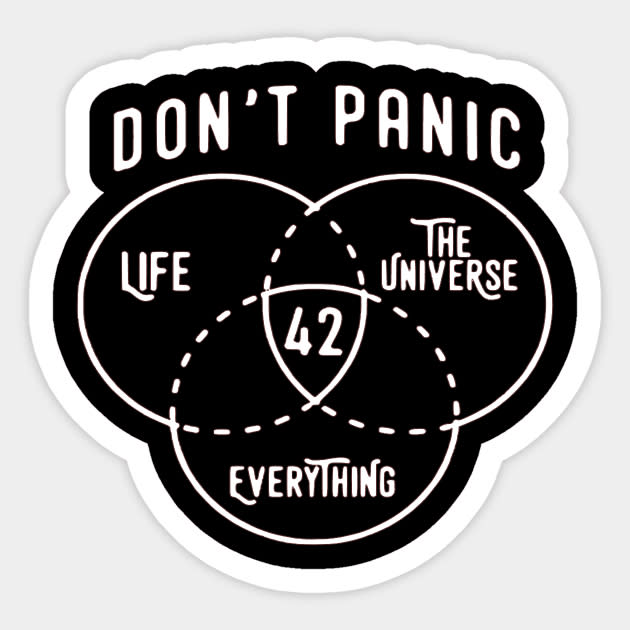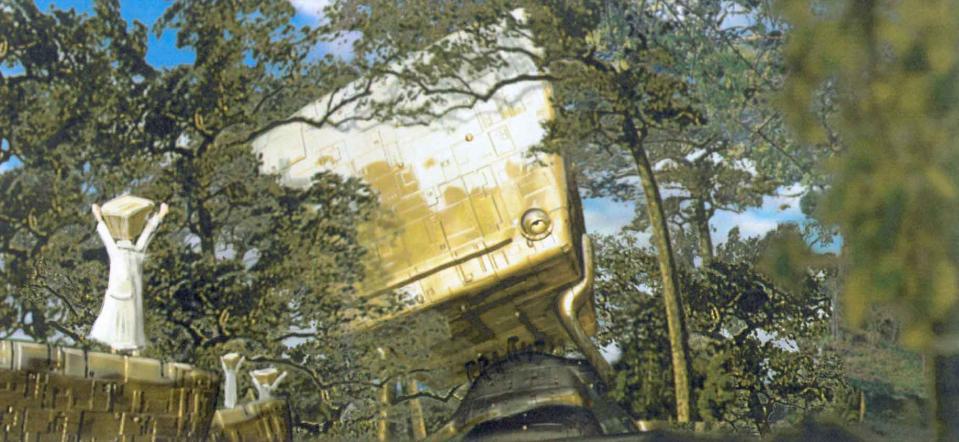42 different ways of looking at baffling answers to stupid questions | MARK HUGHES COBB
- Oops!Something went wrong.Please try again later.
Should I ever be tasked with dissecting humans (metaphorically) with non-humans, I'll start with:
Douglas Adams clearly and succinctly explained "42" had no relevance to anything, the number of folds it takes to reach the moon, judgment of souls, or even Jackie Robinson. It was just punchline to a 7.5-million-year setup.
Adams wrote: “It was a joke. It had to be a number, an ordinary, smallish number, and I chose that one. ... I sat at my desk, stared into the garden and thought ‘42 will do.’ I typed it out. End of story.”
NICK SABAN COMMEMORATIVE BOOK: Relive Nick Saban’s epic Alabama football coaching career with our special book! Preorder here.
And yet humans, many of whom can read, still luxuriate in the fact they have memorized a gag seen by at least 15 million others (estimated copies of "Hitchhiker's Guide to the Galaxy" sold), or witnessed in the TV series, or the 2005 film, or radio series (original form), or stage shows, games, comics, graphic novels ….
Many of these reading humans retain the whimsy of mind to keep rolling 42 as if Adams had unwittingly wired into an ultimate truth, and perhaps bumbled, as Arthur Dent might (from "Life, the Universe and Everything" on the art of flying: "The knack lies in learning how to throw yourself at the ground and miss.") over profundity.
After all, this is the beloved author who created holistic detective Dirk Gently, whose ethos was, essentially: "Whatever I stumble across was what's meant, and will provide answers, including those to questions I hadn't bothered nor indeed wished to ask."

We'd like to believe Adams had prised open the ineffable, and thoroughly effed it.
We make 42 jokes poorly as we do Schrödinger's cat references — In short, the thought experiment was posed to Einstein to point out issues with the Copenhagen interpretation of quantum mechanics. Schrödinger was underlining the fallacy of observation changing the thing observed, by posting an obvious dilemma, that while the observer may not yet know the cat's status, the cat cannot be both alive and dead, and …. OK, not so short — and pat ourselves on the back, a self-satisfied pat that requires twisting of the abdominal area, for wit unearned.
We read Scientific American articles that include Adams' refutation, and yet still attempt to elucidate, because maybe SA found something Adams (tragically gone from us at 49, one of the worst losses of 2001) didn't, or … because it's a cold January and last year's strikes slowed down production of other passive viewing materials.
And we will laugh at ourselves ― me, at myself — for being emblematic of the thing lightly mocked, and still trying to take the, um, urine (Works better in Brit) on the other hand, so to speak, though we should know better, to self-deprecate before one can be other-deprecated, because we're both idiots/not idiots until someone observing tells us otherwise, that someone being us/not us, as we're both everything/not everything and so this article can be whatever you want, observer.

Don't dream it. Just 42 it.
Speaking of grabbing not just the wrong end, but the incorrect thing, here's Adams on how to reframe the thought "Isn't it amazing this world seems built for us?" which ignores dinosaurs, and the Paelozoic, Mesosozic, Proterozoic, Archaean, Hadean and other epochs that preceded us by, at the very least, epochs, and possibly eons:
"There are some oddities in the perspective with which we see the world. The fact that we live at the bottom of a deep gravity well, on the surface of a gas-covered planet going around a nuclear fireball 90 million miles away and think this to be normal is obviously some indication of how skewed our perspective tends to be, but we have done various things over intellectual history to slowly correct some of our misapprehensions. ...
"... Imagine a puddle waking up one morning and thinking, 'This is an interesting world I find myself in — an interesting hole I find myself in — fits me rather neatly, doesn't it? In fact it fits me staggeringly well, may have been made to have me in it!'
"This is such a powerful idea that as the sun rises in the sky and the air heats up and as, gradually, the puddle gets smaller and smaller, it's still frantically hanging on to the notion that everything's going to be all right, because this world was meant to have him in it, was built to have him in it; so the moment he disappears catches him rather by surprise."
In short: Everything's fine ... except maybe this world with humans in it. As our puddle shrivels, ask why belligerent, bellicose bullies seem intent on focusing a magnifiying glass toward our splotchy quagmire.
If you need a dunk, pass the rock to the 6-foot, 6-inch guy. Why is it some will, when brains would be helpful, blow gentle ruminators such as Adams off, and tune in instead to stubby-fingered vulgarians? What's the worst that could come from working with, instead of against, the planet? We leave a healthier world for our mutant offspring?
In the eulogy Richard Dawkins delivered for Adams, he spoke on the happenstance of consciousness, and the microscopic dot of us questing into a void so vast it's said to be ever-expanding, all while knowing our minds couldn't encompass even a bordered version.
" … the opportunity to spend 70 or 80 years of your life in such a universe is time well spent as far as I am concerned," Adams said.
The joke is 42 answers nothing, though it could lead to better questions, as a gassed-cat spurs new ideas.
Adams rather rudely, Fates, got just 49. Six times seven equals 42; seven sevens is 49. Nothing profound to see here, except as mathematics and language represent tools utilized over time, the crowbar inside the crate, to correct misapprehensions.
Mark Hughes Cobb is the editor of Tusk. Reach him at mark.cobb@tuscaloosanews.com.
This article originally appeared on The Tuscaloosa News: Answers work best when phrased as better questions | MARK HUGHES COBB

